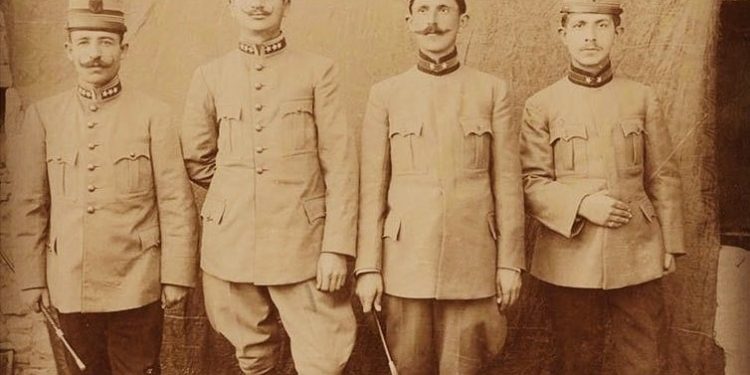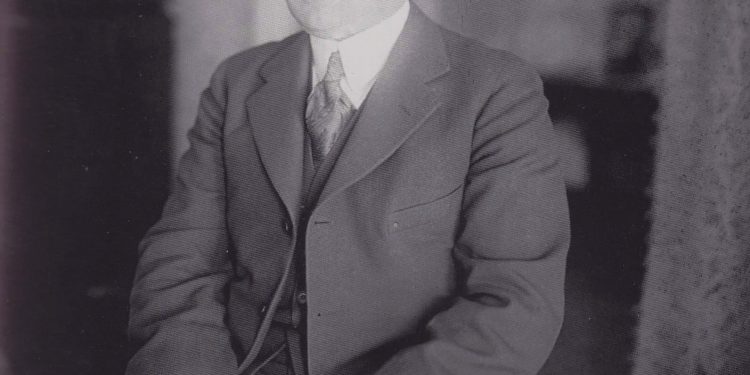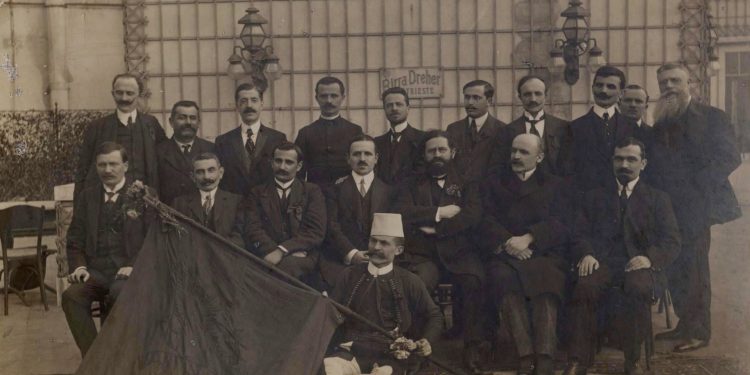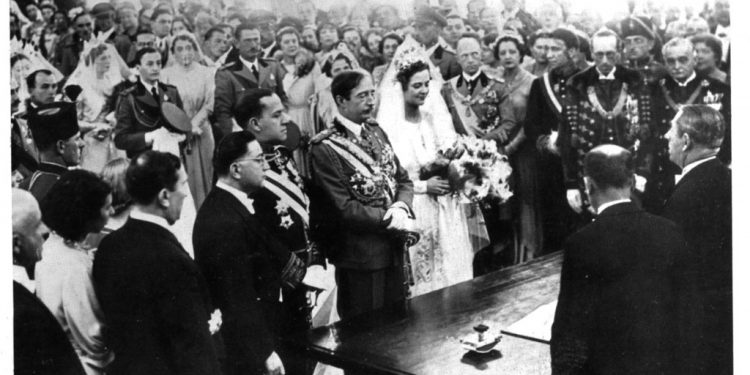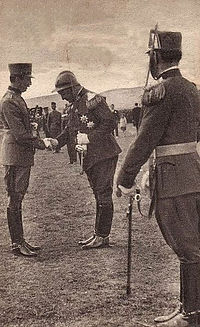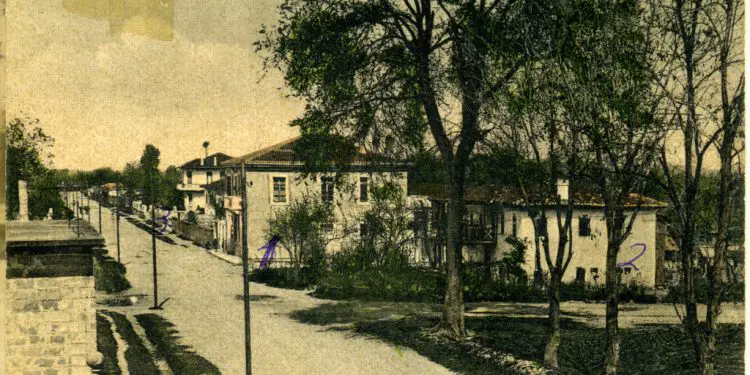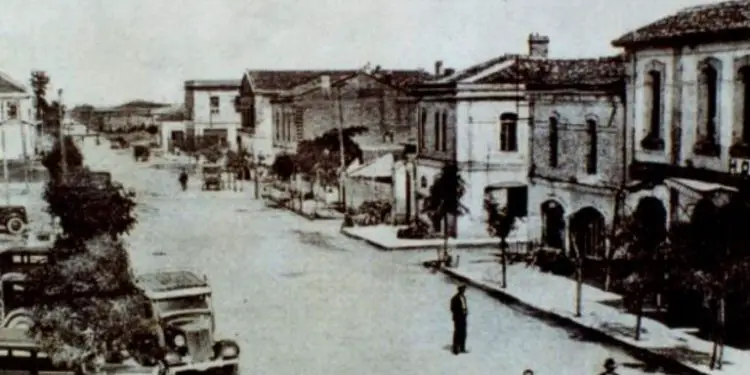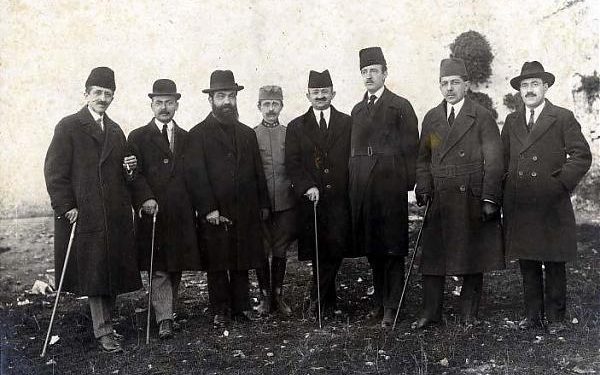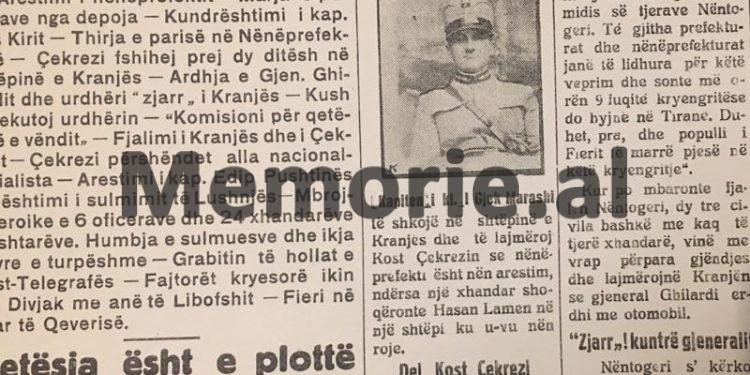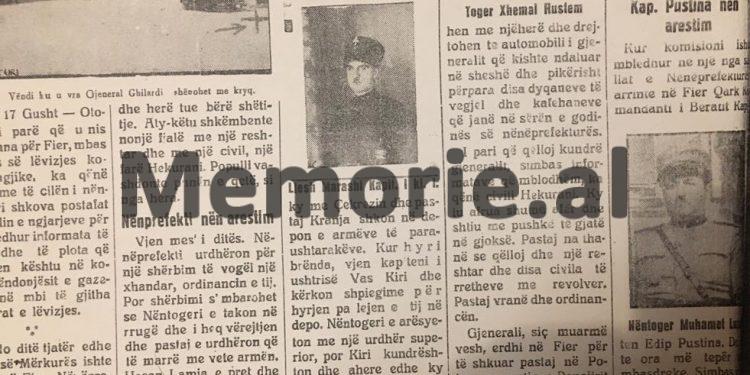Dashnor Kaloçi
Memorie.al publishes the unknown history of the Fier Movement that took place on August 16 and 17, 1935, where a group of former senior soldiers of the Monarchy led by Colonel Ali Shefqet Skopje and Ramiz Dibra, in collaboration with Edip Pustina, Lieutenant Musa Kranjë, Kostë Çekrezin, etc., attempted and started an armed anti-government uprising, initially taking control of the buildings and offices of the sub-prefecture of Fier and then heading to the city of Lushnja, but there they dispersed in fields and villages, after encountering strong resistance from the Commander of its Gendarmerie, Gjek Marashi. How the press of the Zog Monarchy covered the event known as the Fier Uprising, where the general of Hungarian-Croatian origin, Leon de Gjilardi, one of King Zog’s loyalists, was killed by the insurgent forces, who was later buried with great honors at Preza Castle.
85 years ago, on the afternoon of August 16, 1935, in the city of Fier, an armed uprising broke out, which aimed to overthrow the monarchical regime of King Zog. Although the initiators of that uprising, which started suddenly and before the appointed time, were Lieutenant Musa Kranja who at that time served as assistant commander-in-chief of Fier and the well-known publicist and journalist, Kostë Çekrezi, the real perpetrators and “brains” of that uprising stayed in Tirana, and in some other districts of the country. Among its main leaders were some former senior officers released and retired, or active such as Ali Shefqet Skopje, Ramiz Dibra, Riza Cerova, Mustafa Kaçaçi, etc., as well as many civilians such as Ramiz Omari, Shefqet Hekali, etc. Immediately after the suppression of the uprising, government forces began arrests in all cities and provinces where there were people directly involved in the event, who were then given to the “High Court for political guilt”. That trial, where several hundred people sat in the dock, lasted for almost a year and the main leaders of the Fier Uprising were initially sentenced to death, but then they were pardoned by a special decree of King Zog and his sentences were reduced, starting from 101 years and down. This event, which is not a little known in the history of Albania, had a great echo in the press of the Zog Monarchy, where many newspapers of those days covered it with details and details, even making reports from the country of event, Fieri and Lushnja, where there was fighting between insurgent and government forces. One of those newspapers that widely covered the event, was “Vatra”, with publisher Timo Dilon, from which Memorie.al has selected and we are giving in full some of its articles, publishing them without any changes and in written language of that time.
Coverage of the Fier Movement by the newspaper “Vatra” with publisher Timo Dilo
The Don Quixote movement of Fier was suppressed within a very short time.
- The movement started in Fier on Wednesday afternoon.
- The attempt to occupy Lushnja failed due to the resistance of the forces and the help achieved.
- The general de Ghilardi who was killed was in Pojan.
- His body will be buried today in Petrela Castle.
Except for the general and the driver, no one else was killed
The Don Quixote movement that was marked on Wednesday afternoon in Fier and that tried to spread to Lushnje, is taking the way that I started like this and failed within a short time. The Donkishots of Fier, when confronted by the government forces, dispersed in a shameful manner and some of them were thrown into ditches and some of them ran through the fields, cruelly ending their movement against the legal authorities of the country. The reactionary movement was marked for the first time in Fier, around 8 pm. The Assistant Commander of this city, Lieutenant Musa Rustem Kranja, with some other friends, cut the telephone lines and declared themselves the supreme authorities of the city… After this triumphant occupation, they left for Lushnja, which they hoped to have pretending to be in hand without any effort. But here they found a strong resistance from the District Commander Gjek Marashi, assisted by his brother, Llesh Marashi, who was there on the occasion of the appointment (appointment, our appointment), as the District Commander of this city. Between the two sides, an effort took place which started at 10pm on Wednesday and lasted almost three hours. The two Marashi brothers, together with the small power they possessed, maintained a strong resistance. Meanwhile, the government power came to the aid of the Lushnja authorities, and when the don bishops of Fier found out that help came from soldiers, they were ridiculed. Some through the trenches and some others through the fields ended up here and there and government power thus became the lady of the situation. To understand how ridiculous their move was. Suffice it to note that no one was killed or injured on either side. The assassination of Army Inspector De Ghilardi along with his driver, which produced the greatest grief in Tirana where the late General enjoyed the greatest sympathy and general sympathy, his qualities and all that he was of foreign origin, and loved and fought heroically for our country, it became Wednesday night. The inspector had gone to Pojan to visit the Museum of Antiquities and while traveling from Pojan to Fier, he was shot with a rifle and was killed along with the driver. The body of the general was buried in Tirana last night. Special preparations are being made for his funeral. According to the information we have, the general will be buried in Petrela Castles, according to the wish he had shown for a long time. As we said in yesterday’s issue, the government has arrested a large number of instigators of the reactionary movement, and all of them will be tried by the special court. As investigations by the authorities are ongoing, we can not give at this time. We only note that the Government as far as we know was aware of the prepared movement, and a set of leaders of the movement were observed for a long time. It is very likely that the movement was made before the time set by them after they had ascertained that they were being pursued by the authorities, and in order not to be caught by them at the right time, they started the movement. Calmness reigns in all parts of the Kingdom, communication, recently cut off by insurgents, is now in complete order.
“VATRA” at the scene of the uprising (Reportage)
How did the Kranja-Cekrezi movement start and end?
- Arrest of the deputy prefect
- Taking rifles from the warehouse
- Objection of Cap. Vas Kirit
- Call of the sub-prefecture parish
- Cekrezi had been hiding in Kranja’s house for two days
- The Advent of Gen. Ghilardi and the “fire” order of Kranja
- Who executed the order
- “Commission for the peace of the country”
- Speech of Kranja and Çekrez
- Cekrezi greets the nationalists
- Arrest and capture. Oedipus of the Desert
- Failure of the Lushnja attack
- Heroic defense of 6 officers and 24 gendarmes and soldiers
- The loss of the attackers and their shameful escape
- They rob the Post-Telegraph money
- The main culprits flee to Divjaka via Libofsh
- Fier in the hands of the government.
The serenity is complete
Report of Xhem Xhem that I go to Fier after the post
Fier 17 August
The first car that left Tirana for Fier after the suppression of the comic-tragic movement, was the car with which I, the undersigned, went to the scene to collect accurate and complete information so that the singers could be informed. of our newspaper on all the details of the movement. Like every other day, Wednesday was quiet in Fier. Deputy Prefect Mr. Hasan Lame was getting ready to leave the city forever to go to Vlora, and not to Peqin where he was transferred. Lieutenant Muhamet Luzati, Assistant District Commander of the Gendarmerie, is on duty and occasionally walks. Here and there he exchanged words with a sergeant and a civilian, a kind of Hekuran. The people continue to work quietly.
Deputy prefect under arrest (How the event happened)
In the middle of the day, the deputy prefect orders a service for a gendarme, his ordinance. But the service does not end when the Lieutenant meets him on the street and warns him and then orders him to take the weapon with him. Hasan Lamja waits for him and hours go by that do not come. Two o’clock passes, the Lieutenant comes and meets with the Deputy Prefect, and with this they walk in the wide square opposite the post office building. While facing the opposition of Mr. Lame, Kranja declares him under arrest. A sergeant carrying the Lieutenant was then ordered to go to Kranje’s house and inform Kost Çekrez that the deputy prefect was under arrest, while a gendarme accompanied Hasan Lamen to a house where he was put under guard.
Kostë Çekrezi
From the information we gathered, Kostë Çekrezi was in Fier for two days and was kept hidden in the Lieutenant’s house and toasted at the market when he was informed about the arrest of the deputy prefect. The movement now in the piazza begins to become apparent. Some gendarmes and civilians come and go, meet with the Lieutenant, this one with Çekrez and then Kranja goes to the weapons depot of the paramilitaries. When he entered, the army captain, Vas Kiri, came and asked for explanations for entering the depot without permission. The lieutenant justifies it with a superior order, but Kiri objects and then he too is arrested and sent under guard to a house.
Called eternity
It is almost five o’clock in the afternoon. Some civilians seem to be walking the streets calmly and reaching the square in front of the Sub-Prefecture where almost twenty people from the front have gathered. Musa Kranja explains the purpose of the call, tells them that on that day the uprising will be declared throughout Albania. “I announced this here two hours ago,” said the Lieutenant. “All prefectures and sub-prefectures are connected for this action and tonight at nine o’clock the insurgent forces will enter Tirana. The people of Fier must also take part in this uprising “. At the end of the Lieutenant’s speech, two or three civilians, together with so many gendarmes, came running in front of the crowd and informed Kranja that General Ghilardi had come by car.
“Fire!” Against the general
The lieutenant does not ask for details to order: “Fire”! The messengers return immediately and head to the general’s car that had stopped in the square and just in front of some small shops and cafes that are in the back of the sub-prefecture building. The first to shoot at the general, according to the information we gathered, was the civilian Hekurani. He approached him very close and shot him in the chest with a long rifle. We were then told that a sergeant and some district civilians were also shot with revolvers. Then they killed the ordinance. The general, as we learned, came to Fier to then go to Pojan on the occasion of the fair that would take place the next day.
Speak Çekrezi
When Kranja finished his speech, Kostë Çekrezi toasted on the balcony of the sub-prefecture and started giving a speech. At this moment, I start the discourse “governor” of Fier – that with this quality he presents himself Kostë Çekrezi – the assassination of General Ghilardi, this is how the people of Tirana are noticing the assassination of Abduhraman Mati (Lalë Krosit, our note), of Musa Juka, Abdurahman Dibra and others. The insurgents are the masters of all Albania ”Dhe – And then I invite the people of Fier to join them. After a while, with the Lieutenant’s instructions, a commission was formed from the called prefecture of Fier, which was called “the maintenance of peace”. Before this commission, Kranja and Cekrezi gave details. And he said that the army was expected to come to their aid from Berat and Vlora, even though they were making preparations to occupy Lushnja.
Captain Pustina under arrest
When the commission was meeting in one of the halls of the Sub-Prefecture, it found out that the District Commander of Berat, Captain Edip Pustina, was arriving in Fier. And it was more than seven o’clock in the afternoon. According to our information, Captain Pustina was ordered by the Prefect of Berat to take over the command of the district of Fier. Captain Pustina went to take office, but was arrested and accompanied by a guard to a house. The following were arrested: Deputy Prefect Hasan Lame, Captain Vas Kiri and Captain Edip Pustina.
The tranquility of the city
After leaving the cap. Pustina, Musa Kranja recommends the commission to keep calm after ay with his comrades would leave to occupy Lushnja and make available to the commission five or six gendarmes and weapons. Patrols were thus formed with two civilians and a gendarme each, and all night they came around the city. Before the Lieutenant left, I recommend to the commission that the three detainees do not suffer anything bad and that the telephone clerk not open or accept communication with any place or person.
Towards Lushja
When they set out to occupy Lushnja, it would be nine o’clock. The leader was Lieutenant, Çekrezi and some others, and along the way it seems that the villagers and so with a force of 200 or so people, with trucks and cars left for Lushnje. Meanwhile, Lushnja had received the news of the Fier movement and their departure for Lushnje. The governmental power of this city consisted of 24 gendarmes and soldiers, and 4 officers, Lieutenants Sulejman Hosceka, Xhemal Rustemi and lieutenants Muhamet Luzati and Isa Drishti. At the time when the news of the movement had arrived and the four officers were preparing to take measures for resistance, the brothers Gjek and Llesh Marashi, both captains of the Gendarmerie, respectively, the District Commanders of Lushnja and Fier, arrived from Shkodra.
Oath to the King
They all decided to resist until death and once again repeated the oath to the King, lined up on all sides of the buildings of the sub-prefecture and waited. Around 11 o’clock at night, the noise of trucks and cars is heard from the street of Lushnja, and when they are offered almost 1000 meters to the city, the lights of the cars go out. They are the insurgents. Gjek Marashi is in charge of the defense, as the oldest and in the capacity of the Garrison Commander. When the rebels approach and enter the courtyard of the building from the side of Lushnja and approach its main gate, a battery jumps. The insurgents loudly call on the brave and loyal officers to surrender because their defense was in vain, as all but Lushnja had fallen into their hands. This fox invitation was answered with applause for the King and the rifle thus began at once. We forgot to note that along with the gendarmes of Lushnja, who were fighting, was the conductor, Alush Hoxha from Shkodra. From the regular forces, 1031 rifles were fired. God knows how many were thrown by the rebels.
Heroism of officers
The heroism and loyalty of the officers and gendarmes of Lushnja are to be admired. They put up a strange resistance, and with almost 10 times the strength of the attackers, they were able to withstand the attack and thus force them to return shamefully.
Hymn of the King
Two gendarmes who had taken up residence behind a wall near the outer entrance gate reserved for the gendarmerie, sang the King’s anthem while rising. The exterior of the Sub-Prefecture building is full of holes caused by rifles. Hundreds have these signs. Gjek Marashi loudly encourages his brave friends and excites them with his courage.
The insurgents retreat
When I start bleaching, the fighting stops. Thrown through the ditches, some run across the fields, shamefully. Meanwhile other governmental powers came under the command of the Lieutenant. Zyhdi Cami, while from Mallakastra the people of the region under the command of MP Hysni Toska ran voluntarily and quickly against the insurgents.
The mayors are fleeing
In Fier it was not yet known what happened in Lushnje. The commission in charge of tranquility was still interested in the tranquility of the city. Someone there at 5 o’clock in the morning after seeing Musa Kranja who had entered Fier by car and left after a while with speed. Only at 8 o’clock in the morning did the people of Fier find out that the uprising had failed. Thus it was later learned that Kranja, Çekrezi, Hekurani and a sergeant with the driver Peçi Gera, headed to the edge of the Divjaka sea, via Libofsh. It is even said that they once stayed in Libofsha to drink coffee. When they reached the border guard (Coast Guard), the lieutenant introduced Çekrez as an Italian engineer who had allegedly come there to study, and after giving instructions to prepare lunch, took the road down to where there was a petrol station (motor boat). . They left the driver near the sea and threatened him with a rifle if he left two hours ago and he did not change for fear. We forgot to note that some told us that Kranja had taken with her the money that was in the Post-Telegraph box office. When it was learned that the leaders of the movement were leaving, a sergeant advised by the commission called and announced that he had been arrested. Oedipus Pustina to go out and take over the command of the gendarmerie and after this duel and the Deputy Prefect with cap. Vas Kellen. Then the head of the Command Area arrived from Lushnja, chap. Llesh Marashi and Lieutenant Colonel Ali Rizai as commander of the army operation. The situation thus entered normalcy and calm reigns everywhere.
Who was General Gjilardi?
21 years ago, a foreigner, an admirer of Albania, the Dutch Colonel, Thomson, was martyred by the treacherous bullets of the rebels. At a time when the entire Albanian people with reverence, gratitude and deep respect honored his memory, bloody hands, not with Albanian spirit, but with criminal instincts left dead the brave General, Leon de Ghilardi, who left his duties and ranks who had in the Austrian Empire and was put in the service of the Albanian state with the lowest ranks, fighting in Korça, Skrapar and Lesh, and in the highlands of Dibra and Kosovo, even around Tirana with an ideal, with a purpose , for the stabilization of the Albanian State. These unforgettable services were appreciated by the State and our Sovereign Augustus, entrusting him with the high duty of Inspector General of the Army at the Royal Court. This is, in short, General Leon de Guillard, but in our souls and boyhoods, your magnificent face and legendary trinity will always remain a symbol, and the people show their sympathy for the barbaric criminals who drove you so quickly out of his bosom. And Justice demands satisfaction. Mercy has its limits, especially against the bloodthirsty who raised their hands against Mother Albania, any feeling of mercy is a crime. The test of paternal mercy shown on many occasions by the generous spirit of our Sovereign, gave the opposite consequences. Redisivists need no mercy. The sword of righteousness must fall mercilessly against all of them. The sword of justice must fall mercilessly against those who have no other program in their lives but to live and speculate at the expense of the inoncent people, pushing into adventures that endanger the existence of the state. The government has responsibility towards the State and the King in case it shows laziness and suggests mercy for persons who have been condemned by the conscience of the people. The people expect the Special Court to apply the law strictly and mercilessly against the authors and the perpetrators, not to give satisfaction to the soul of General Leon de Guillard, because he took that satisfaction with a free and independent Albania, but for to put an end to such adventures once and for all and not to disrupt the path of progress and civilization that broke it ten years ago, continues our state under the genius leadership of King Zog I.
The funeral ceremonies were attended by the highest authorities of the Monarchy
The magnificent funeral in Tirana of General Leon de Gjilardi
Among the many articles that the newspaper “Vatra” with publisher Timo Dilon devoted to the events of Fier, in mid-August 1935, a special place it reserved for the figure of General Leon de Gjilardi, who was killed by insurgent forces , as well as the magnificent funeral ceremonies that took place in Tirana and in Petrela Castle, where his body was laid to rest. Regarding this, among other things, the newspaper “Vatra” wrote: “The great funeral of the general takes place under general longing. – The king gives the final greeting. And at 10 o’clock the funeral took place. By 9 o’clock, the troops had taken up positions in front of one of the wards of the Military Hospital, where the general’s body was placed. The funeral was attended by NM of Tire Sali and Hysen, the Prime Minister with all the ministers, the Diplomatic Corps, the deputies present here, the grand uniformed offices, the senior officials with taite and cylinder (a kind of dress for ceremonial occasions and round republican hats), as and a great majority of the people. The crowns were numerous; They were called that of His Majesty the King, with the dedication: “To Ghilard my friend and my very brave and valuable soldier, Bird I”, of the Princesses, Prince Tat, Princes Sali and Hysen, the King’s Adjutant, the Royal Army, the Council of Ministers , Italian Minister, English Legation, Italian Military Attaché, Municipality of Fier, General Percy, Italian Organizer Office, Municipality of the Capital, Royal Guard Command, Abdurahman Mati, Presidency of the Autocephalous Orthodox Church, Albanian Military Hospital, Representation of Women Commerce, the SITA Association, the Rua Detachment, the Military Court at the Royal Court, the Royal Brotherhood Weapon and many more. The cortege was opened by a platoon of Cavalry, followed by the Military Gangs with black tools, Baoni (Battalion), “Deja”, with three companies and the Flag, the Division Artillery Group on foot, the Crowns, the Clergy. Behind the Clergy came the Corpse which was placed on the bed of a ball drawn by six horses covered with black cloth and a math Flag. On both sides lined up the officers, lieutenants: Masar Kryeziu, Rifat Jakova, Atif Golja, Hysen Jegeni, Shaqir Muça, Nazim Baraku, Ali Feti Picari, Irfan, Rifat and Hektor Zaharia, Ragip Kalenja, Veli Shtylla and lieutenant Itball Shapllo and Platoon of Baon soldiers “Deja”, Behind the coffin came an officer holding the General’s decorations, and his horse covered in black. In the first line behind the corpse came the representatives of His Majesty, the King, Prince Sali and Hussein, the Adjutant Officers, the Prime Minister, the Speaker of Parliament, the Ministers, the Diplomatic Corps, the Commander of the National Defense, senior state officials, officers, the country’s leadership and people. The procession formed in this way crossed the street of Dibra, Zog Boulevard, where it stopped a little in front of the Catholic Church for the usual prayer, and turning from the other side of Zog Boulevard continued to 28 Nëndori Street. Arriving in front of the Royal Palace, he stopped for a few minutes where N. M. His King had come out to greet for the last time His brave and very valuable companion and soldier. His N. M., the King with all his might, could not bear the longing which he felt and which was evident in the features of His face. The cortege continued on its way and stopped at the Elbasan street police post, where the Commander of the National Defense said his last goodbyes to the deceased with these words: “Ghilard, dear friend, With a poisoned heart and tears in your eyes, come with him gave the last greeting. The cruel hand tore us apart. A martyr cloud for Albania, for the King. Your memory will never be forgotten “./Memorie.al




